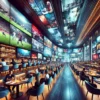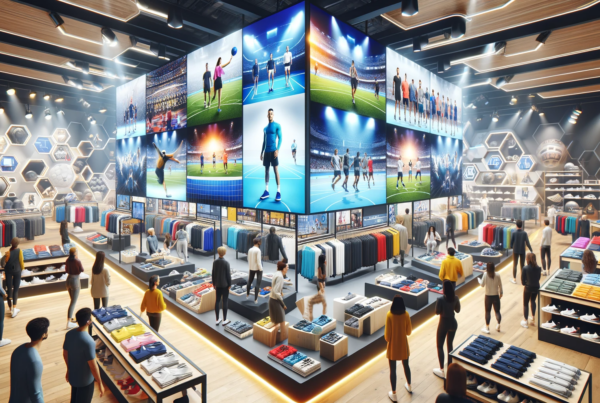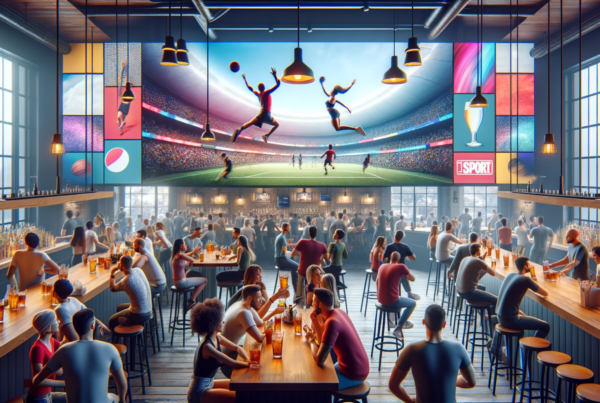Introduction to Entertainment Solutions in Multi-Location Organizations
For multi-location organizations, providing consistent and engaging entertainment across various branches can be a daunting task. The challenges of managing multiple systems, ensuring uniform content delivery, and dealing with logistical complexities are significant. However, with the right entertainment solutions for multi-location organizations, these challenges can be transformed into opportunities for creating a harmonious and branded entertainment experience.
Centralized entertainment systems offer a plethora of benefits, including scalability to grow with the organization, cost savings through streamlined operations, and seamless management of content and hardware. In this comprehensive guide, we will explore the various solutions available, their advantages, and how they can be tailored to meet the unique needs of multi-location businesses like Sports Direct.
Understanding the landscape of entertainment solutions is crucial for decision-makers. By leveraging technology and strategic planning, organizations can enhance their brand presence, improve customer experience, and foster a positive work environment for employees. Let’s delve into the specifics of what these solutions entail and how they can be effectively implemented.
Centralized Entertainment Systems: A Game-Changer
Centralized entertainment systems serve as the cornerstone for efficient management of entertainment across multiple locations. By adopting a unified platform, organizations can streamline operations, reduce redundancy, and maintain control over the content being broadcasted. This not only ensures a consistent brand message but also significantly reduces the complexities involved in managing disparate systems.
One of the primary advantages of a centralized system is the ability to push updates and content changes from a single point of control. This means that promotional materials, live events, or branded content can be synchronized across all locations, ensuring that every branch reflects the same messaging and quality of entertainment. Furthermore, these systems are designed to be scalable, accommodating the addition of new locations with minimal disruption.
Cost savings are another compelling reason for multi-location organizations to consider centralized entertainment solutions. By consolidating resources and utilizing a shared infrastructure, businesses can minimize the investment required for individual location setups. Additionally, centralized systems often come with advanced analytics capabilities, enabling organizations to measure the effectiveness of their content and make data-driven decisions to enhance engagement.
Seamless Management and Customization Options
The ability to manage entertainment solutions seamlessly is a vital consideration for businesses operating in multiple locations. Centralized systems offer a level of simplicity in administration that is unmatched by traditional, decentralized setups. With intuitive dashboards and management tools, administrators can monitor system performance, schedule content, and troubleshoot issues from a central hub.
Customization is another aspect where centralized entertainment solutions shine. Multi-location organizations often have diverse needs based on their geographical location, target audience, and brand strategy. Centralized systems provide the flexibility to tailor content and delivery to these specific requirements. Whether it’s custom playlists, localized advertising, or interactive content, businesses can create a unique entertainment experience that resonates with their audience.
Moreover, with the integration of advanced technologies such as artificial intelligence and machine learning, these systems can adapt and evolve based on user engagement and feedback. This level of responsiveness ensures that the entertainment provided remains fresh, relevant, and aligned with consumer preferences.
Implementing Entertainment Solutions: Best Practices
When it comes to implementing entertainment solutions for multi-location organizations, there are several best practices to consider. Firstly, it’s important to conduct a thorough needs assessment to understand the specific requirements of each location. This includes analyzing the demographic of the audience, the type of content that will be most engaging, and any technical constraints that may exist.
Once the needs have been identified, selecting the right technology partner is crucial. Look for providers with a proven track record in delivering robust and reliable entertainment solutions for multi-location businesses. They should offer comprehensive support, from installation to ongoing maintenance, ensuring that the system remains operational and up-to-date.
Training and empowering staff is another key factor in the successful deployment of entertainment solutions. Employees should be well-versed in the functionality of the system, able to troubleshoot common issues, and capable of updating content as needed. This not only ensures smooth operations but also maximizes the potential of the entertainment system to enhance the customer experience.
Conclusion: The Future of Entertainment in Multi-Location Organizations
As multi-location organizations continue to evolve, the role of entertainment solutions becomes increasingly important. The future of these systems lies in their ability to offer immersive and interactive experiences that engage customers and employees alike. With advancements in technology, we can expect to see more personalized content, integration with social media, and innovative ways to interact with audiences.
The benefits of centralized entertainment solutions for multi-location organizations are clear: scalability, cost savings, and seamless management. By embracing these solutions, businesses like Sports Direct can ensure a cohesive and engaging entertainment experience across all their locations, reinforcing their brand and delighting their audience.
As we look ahead, it’s evident that the organizations that prioritize and invest in these solutions will be the ones to set themselves apart in a competitive market. The key to success lies in staying ahead of the curve, continually adapting to new trends, and leveraging entertainment as a strategic asset.








